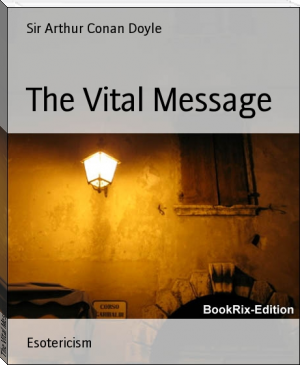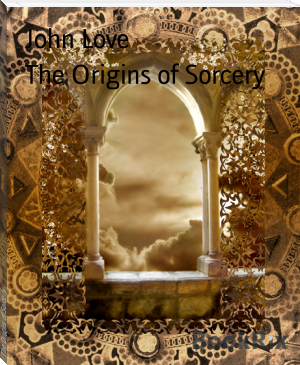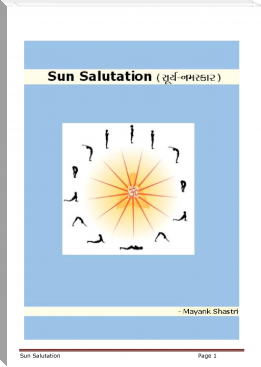The Vital Message - Sir Arthur Conan Doyle (story books for 5 year olds txt) 📗

- Author: Sir Arthur Conan Doyle
Book online «The Vital Message - Sir Arthur Conan Doyle (story books for 5 year olds txt) 📗». Author Sir Arthur Conan Doyle
admit, as these observers do, that spirits do return, that they give every proof of being the actual friends whom we have lost, and yet to turn a deaf ear to the messages which they send would seem to be pushing caution to the verge of unreason. To get so far, and yet not to go further, is impossible as a permanent position. If, for example, in Raymond's case we find so many allusions to the small details of his home upon earth, which prove to be surprisingly correct, is it reasonable to put a blue pencil through all he says of the home which he actually inhabits? Long before I had convinced my mind of the truth of things which appeared so grotesque and incredible, I had a long account sent by table tilting about the conditions of life beyond. The details seemed to me impossible and I set them aside, and yet they harmonise, as I now discover, with other revelations. So, too, with the automatic script of Mr. Hubert Wales, which has been described in my previous book. He had tossed it aside into a drawer as being unworthy of serious consideration, and yet it also proved to be in harmony. In neither of these cases was telepathy or the prepossession of the medium a possible explanation. On the whole, I am inclined to think that these doubtful or dissentient scientific men, having their own weighty studies to attend to, have confined their reading and thought to the more objective side of the question, and are not aware of the vast amount of concurrent evidence which appears to give us an exact picture of the life beyond. They despise documents which cannot be proved, and they do not, in my opinion, sufficiently realise that a general agreement of testimony, and the already established character of a witness, are themselves arguments for truth. Some complicate the question by predicating the existence of a fourth dimension in that world, but the term is an absurdity, as are all terms which find no corresponding impression in the human brain. We have mysteries enough to solve without gratuitously introducing fresh ones. When solid passes through solid, it is, surely, simpler to assume that it is done by a dematerialisation, and subsequent reassembly--a process which can, at least, be imagined by the human mind--than to invoke an explanation which itself needs to be explained.
In the next and final chapter I will ask the reader to accompany me in an examination of the New Testament by the light of this psychic knowledge, and to judge how far it makes clear and reasonable much which was obscure and confused.
CHAPTER V
IS IT THE SECOND DAWN?
There are many incidents in the New Testament which might be taken as starting points in tracing a close analogy between the phenomenal events which are associated with the early days of Christianity, and those which have perplexed the world in connection with modern Spiritualism. Most of us are prepared to admit that the lasting claims of Christianity upon the human race are due to its own intrinsic teachings, which are quite independent of those wonders which can only have had a use in startling the solid complacence of an unspiritual race, and so directing their attention violently to this new system of thought. Exactly the same may be said of the new revelation. The exhibitions of a force which is beyond human experience and human guidance is but a method of calling attention. To repeat a simile which has been used elsewhere, it is the humble telephone bell which heralds the all-important message. In the case of Christ, the Sermon on the Mount was more than many miracles. In the case of this new development, the messages from beyond are more than any phenomena. A vulgar mind might make Christ's story seem vulgar, if it insisted upon loaves of bread and the bodies of fish. So, also, a vulgar mind may make psychic religion vulgar by insisting upon moving furniture or tambourines in the air. In each case they are crude signs of power, and the essence of the matter lies upon higher planes.
It is stated in the second chapter of the Acts of the Apostles, that they, the Christian leaders, were all "with one accord" in one place. "With one accord" expresses admirably those sympathetic conditions which have always been found, in psychic circles, to be conducive of the best results, and which are so persistently ignored by a certain class of investigators. Then there came "a mighty rushing wind," and afterwards "there appeared cloven tongues like unto fire and it sat upon each of them." Here is a very definite and clear account of a remarkable sequence of phenomena. Now, let us compare with this the results which were obtained by Professor Crookes in his investigation in 1873, after he had taken every possible precaution against fraud which his experience, as an accurate observer and experimenter, could suggest. He says in his published notes: "I have seen luminous points of light darting about, sitting on the heads of different persons" and then again:
"These movements, and, indeed, I may say the same of every class of phenomena, are generally preceded by a peculiar cold air, sometimes amounting to a decided wind. I have had sheets of paper blown about by it. . . ." Now, is it not singular, not merely that the phenomena should be of the same order, but that they should come in exactly the same sequence, the wind first and the lights afterwards? In our ignorance of etheric physics, an ignorance which is now slowly clearing, one can only say that there is some indication here of a general law which links those two episodes together in spite of the nineteen centuries which divide them. A little later, it is stated that "the place was shaken where they were assembled together." Many modern observers of psychic phenomena have testified to vibration of the walls of an apartment, as if a heavy lorry were passing. It is, evidently, to such experiences that Paul alludes when he says: "Our gospel came unto you not in word only, but also in power." The preacher of the New Revelation can most truly say the same words. In connection with the signs of the pentecost, I can most truly say that I have myself experienced them all, the cold sudden wind, the lambent misty flames, all under the mediumship of Mr. Phoenix, an amateur psychic of Glasgow. The fifteen sitters were of one accord upon that occasion, and, by a coincidence, it was in an upper room, at the very top of the house.
In a previous section of this essay, I have remarked that no philosophical explanation of these phenomena, known as spiritual, could be conceived which did not show that all, however different in their working, came from the same central source. St. Paul seems to state this in so many words when he says: "But all these worketh that one and the selfsame spirit, dividing to every man severally as he will." Could our modern speculation, forced upon us by the facts, be more tersely stated? He has just enumerated the various gifts, and we find them very close to those of which we have experience. There is first "the word of wisdom," "the word of knowledge" and "faith." All these taken in connection with the Spirit would seem to mean the higher communications from the other side. Then comes healing, which is still practised in certain conditions by a highly virile medium, who has the power of discharging strength, losing just as much as the weakling gains, as instanced by Christ when He said: "Who has touched me? Much virtue" (or power) "has gone out of me." Then we come upon the working of miracles, which we should call the production of phenomena, and which would cover many different types, such as apports, where objects are brought from a distance, levitation of objects or of the human frame into the air, the production of lights and other wonders. Then comes prophecy, which is a real and yet a fitful and often delusive form of mediumship--never so delusive as among the early Christians, who seem all to have mistaken the approaching fall of Jerusalem and the destruction of the Temple, which they could dimly see, as being the end of the world. This mistake is repeated so often and so clearly that it is really not honest to ignore or deny it. Then we come to the power of "discerning the spirits," which corresponds to our clairvoyance, and finally that curious and usually useless gift of tongues, which is also a modern phenomenon. I can remember that some time ago I read the book, "I Heard a Voice," by an eminent barrister, in which he describes how his young daughter began to write Greek fluently with all the complex accents in their correct places. Just after I read it I received a letter from a no less famous physician, who asked my opinion about one of his children who had written a considerable amount of script in mediaeval French. These two recent cases are beyond all doubt, but I have not had convincing evidence of the case where some unintelligible signs drawn by an unlettered man were pronounced by an expert to be in the Ogham or early Celtic character. As the Ogham script is really a combination of straight lines, the latter case may be taken with considerable reserve.
Thus the phenomena associated with the rise of Christianity and those which have appeared during the present spiritual ferment are very analogous. In examining the gifts of the disciples, as mentioned by Matthew and Mark, the only additional point is the raising of the dead. If any of them besides their great leader did in truth rise to this height of power, where life was actually extinct, then he, undoubtedly, far transcended anything which is recorded of modern mediumship. It is clear, however, that such a power must have been very rare, since it would otherwise have been used to revive the bodies of their own martyrs, which does not seem to have been attempted. For Christ the power is clearly admitted, and there are little touches in the description of how it was exercised by Him which are extremely convincing to a psychic student. In the account of how He raised Lazarus from the grave after he had been four days dead--far the most wonderful of all Christ's miracles--it is recorded that as He went down to the graveside He was "groaning." Why was He groaning? No Biblical student seems to have given a satisfactory reason. But anyone who has heard a medium groaning before any great manifestation of power will read into this passage just that touch of practical knowledge, which will convince him of its truth. The miracle, I may add, is none the less wonderful or beyond our human powers, because it was wrought by an extension of natural law, differing only in degree with that which we can ourselves test and even do.
Although our modern manifestations have never attained the power mentioned in the Biblical records, they present some features which are not related in the New Testament. Clairaudience, that is the hearing of a spirit voice, is common to both, but the direct voice, that is the hearing of a voice which all can discern with their material ears, is a well-authenticated phenomenon now which is more
In the next and final chapter I will ask the reader to accompany me in an examination of the New Testament by the light of this psychic knowledge, and to judge how far it makes clear and reasonable much which was obscure and confused.
CHAPTER V
IS IT THE SECOND DAWN?
There are many incidents in the New Testament which might be taken as starting points in tracing a close analogy between the phenomenal events which are associated with the early days of Christianity, and those which have perplexed the world in connection with modern Spiritualism. Most of us are prepared to admit that the lasting claims of Christianity upon the human race are due to its own intrinsic teachings, which are quite independent of those wonders which can only have had a use in startling the solid complacence of an unspiritual race, and so directing their attention violently to this new system of thought. Exactly the same may be said of the new revelation. The exhibitions of a force which is beyond human experience and human guidance is but a method of calling attention. To repeat a simile which has been used elsewhere, it is the humble telephone bell which heralds the all-important message. In the case of Christ, the Sermon on the Mount was more than many miracles. In the case of this new development, the messages from beyond are more than any phenomena. A vulgar mind might make Christ's story seem vulgar, if it insisted upon loaves of bread and the bodies of fish. So, also, a vulgar mind may make psychic religion vulgar by insisting upon moving furniture or tambourines in the air. In each case they are crude signs of power, and the essence of the matter lies upon higher planes.
It is stated in the second chapter of the Acts of the Apostles, that they, the Christian leaders, were all "with one accord" in one place. "With one accord" expresses admirably those sympathetic conditions which have always been found, in psychic circles, to be conducive of the best results, and which are so persistently ignored by a certain class of investigators. Then there came "a mighty rushing wind," and afterwards "there appeared cloven tongues like unto fire and it sat upon each of them." Here is a very definite and clear account of a remarkable sequence of phenomena. Now, let us compare with this the results which were obtained by Professor Crookes in his investigation in 1873, after he had taken every possible precaution against fraud which his experience, as an accurate observer and experimenter, could suggest. He says in his published notes: "I have seen luminous points of light darting about, sitting on the heads of different persons" and then again:
"These movements, and, indeed, I may say the same of every class of phenomena, are generally preceded by a peculiar cold air, sometimes amounting to a decided wind. I have had sheets of paper blown about by it. . . ." Now, is it not singular, not merely that the phenomena should be of the same order, but that they should come in exactly the same sequence, the wind first and the lights afterwards? In our ignorance of etheric physics, an ignorance which is now slowly clearing, one can only say that there is some indication here of a general law which links those two episodes together in spite of the nineteen centuries which divide them. A little later, it is stated that "the place was shaken where they were assembled together." Many modern observers of psychic phenomena have testified to vibration of the walls of an apartment, as if a heavy lorry were passing. It is, evidently, to such experiences that Paul alludes when he says: "Our gospel came unto you not in word only, but also in power." The preacher of the New Revelation can most truly say the same words. In connection with the signs of the pentecost, I can most truly say that I have myself experienced them all, the cold sudden wind, the lambent misty flames, all under the mediumship of Mr. Phoenix, an amateur psychic of Glasgow. The fifteen sitters were of one accord upon that occasion, and, by a coincidence, it was in an upper room, at the very top of the house.
In a previous section of this essay, I have remarked that no philosophical explanation of these phenomena, known as spiritual, could be conceived which did not show that all, however different in their working, came from the same central source. St. Paul seems to state this in so many words when he says: "But all these worketh that one and the selfsame spirit, dividing to every man severally as he will." Could our modern speculation, forced upon us by the facts, be more tersely stated? He has just enumerated the various gifts, and we find them very close to those of which we have experience. There is first "the word of wisdom," "the word of knowledge" and "faith." All these taken in connection with the Spirit would seem to mean the higher communications from the other side. Then comes healing, which is still practised in certain conditions by a highly virile medium, who has the power of discharging strength, losing just as much as the weakling gains, as instanced by Christ when He said: "Who has touched me? Much virtue" (or power) "has gone out of me." Then we come upon the working of miracles, which we should call the production of phenomena, and which would cover many different types, such as apports, where objects are brought from a distance, levitation of objects or of the human frame into the air, the production of lights and other wonders. Then comes prophecy, which is a real and yet a fitful and often delusive form of mediumship--never so delusive as among the early Christians, who seem all to have mistaken the approaching fall of Jerusalem and the destruction of the Temple, which they could dimly see, as being the end of the world. This mistake is repeated so often and so clearly that it is really not honest to ignore or deny it. Then we come to the power of "discerning the spirits," which corresponds to our clairvoyance, and finally that curious and usually useless gift of tongues, which is also a modern phenomenon. I can remember that some time ago I read the book, "I Heard a Voice," by an eminent barrister, in which he describes how his young daughter began to write Greek fluently with all the complex accents in their correct places. Just after I read it I received a letter from a no less famous physician, who asked my opinion about one of his children who had written a considerable amount of script in mediaeval French. These two recent cases are beyond all doubt, but I have not had convincing evidence of the case where some unintelligible signs drawn by an unlettered man were pronounced by an expert to be in the Ogham or early Celtic character. As the Ogham script is really a combination of straight lines, the latter case may be taken with considerable reserve.
Thus the phenomena associated with the rise of Christianity and those which have appeared during the present spiritual ferment are very analogous. In examining the gifts of the disciples, as mentioned by Matthew and Mark, the only additional point is the raising of the dead. If any of them besides their great leader did in truth rise to this height of power, where life was actually extinct, then he, undoubtedly, far transcended anything which is recorded of modern mediumship. It is clear, however, that such a power must have been very rare, since it would otherwise have been used to revive the bodies of their own martyrs, which does not seem to have been attempted. For Christ the power is clearly admitted, and there are little touches in the description of how it was exercised by Him which are extremely convincing to a psychic student. In the account of how He raised Lazarus from the grave after he had been four days dead--far the most wonderful of all Christ's miracles--it is recorded that as He went down to the graveside He was "groaning." Why was He groaning? No Biblical student seems to have given a satisfactory reason. But anyone who has heard a medium groaning before any great manifestation of power will read into this passage just that touch of practical knowledge, which will convince him of its truth. The miracle, I may add, is none the less wonderful or beyond our human powers, because it was wrought by an extension of natural law, differing only in degree with that which we can ourselves test and even do.
Although our modern manifestations have never attained the power mentioned in the Biblical records, they present some features which are not related in the New Testament. Clairaudience, that is the hearing of a spirit voice, is common to both, but the direct voice, that is the hearing of a voice which all can discern with their material ears, is a well-authenticated phenomenon now which is more
Free e-book «The Vital Message - Sir Arthur Conan Doyle (story books for 5 year olds txt) 📗» - read online now
Similar e-books:





Comments (0)